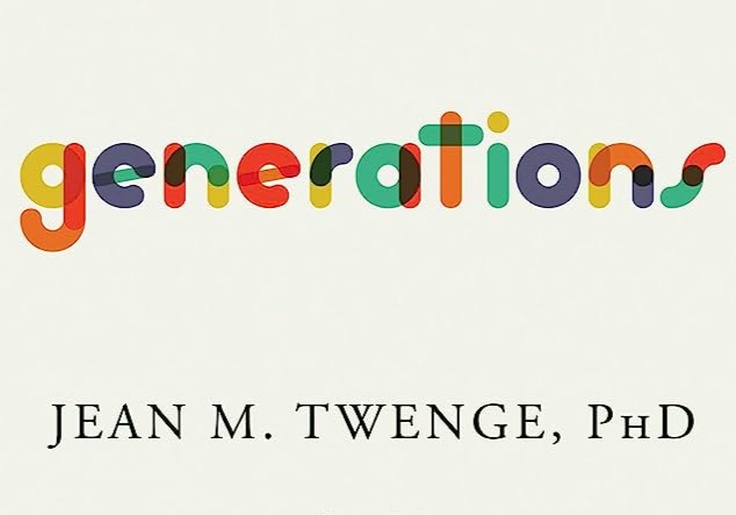Generational differences have long been an intriguing subject of study and speculation. In Generations: The Real Differences Between Gen Z, Millennials, Gen X, Boomers, and Silents—and What They Mean for America’s Future, Dr. Jean Twenge, an expert in the field of generational analysis and author of iGen and Generation Me, embarks on a groundbreaking exploration of the behaviors, attitudes, values, and personality traits that make up each generation’s identity.
Exploring the nation’s six living generations—Silents (born 1925-1945), Boomers (1946-1964), Generation X (1965-1979), Millennials (1980-1994), Generation Z (1995-2012), and an as-yet-unnamed generation born after 2013, referred to as Polars—Twenge challenges the prevailing notion that major historical events are the primary architects of generational disparities.
Instead, armed with an extensive arsenal of data spanning nearly a hundred years and 39 million people, Twenge argues that the true catalyst behind these variations is technology, along with the intervening forces of individualism—defined by Twenge as an increased focus on the individual self—and a slower life trajectory—taking longer to grow to adulthood and to age—relabeling major historical events as mere variables.
Twenge tells of Silents ushering in some of the most impactful social changes in American history, while new technologies planted the seeds of individualism that would spark the social upheaval of the 1960s. Boomers pushed these core values of counterculture into the mainstream with their own brand of individualism while also cementing in place the notion of choice throughout every aspect of their life experience (from "the essential to the trivial"). Gen X—known by Boomers as the generation after Woodstock, after Vietnam War protests, and after the civil rights and feminist movements—found themselves in the middle of the influences of technology, individualism, and the slow-life strategy, making them the "middle child of generations." Millennials—the most educated generation in American history, for better and for worse—are the culmination of the generational trends of technology, individualism, and the slow-life strategy of the two generations before them. And finally, there’s Gen Z, who are concerned (and even stunted) by their desire to remain authentic, confront political issues, explore gender, and struggle with mental health.
Each chapter, taking us across the nation’s six generations, is sewn together by major historical events: the AIDS epidemic, the September 11 attacks, the Great Recession, and the COVID-19 pandemic.
What makes Generations such an enjoyable and informative read is that it goes far beyond providing a mere historical expedition to offering a profound meditation on the intricate interplay of technology and humanity. Across each generation, Twenge traverses multiple areas of American society and culture, including gender, income, politics, race, sexuality, marriage, and mental health with precision, turning the image of each generation’s unique journey from black and white to technicolor, and helping the reader see beyond simple generational labels and instead foster a deeper understanding of one another.
It makes sense that the subject of politics appears throughout Generations, with Twenge warning that political party warfare has increasingly become generational warfare, made worse by inter-generational battles over subjects relating to free speech, equality, and gender. While Twenge addresses other areas with careful objectivity, however, she demonstrates a layer of political bias while discussing numerous divisive topics, perhaps indicative of the country’s educational ideological division discussed in various chapters.
Obama’s "eight relatively scandal-free years" are mentioned, as is the now meme-fodder clichéd "pouncing" of right-leaning media. While discussing the rise of "bizarre" online conspiracy theories, only far-right instances are provided, while the two examples of cross-generational familial breakdowns over political views centered on the rejection of Republicans by Democrats. Then there was the implication that Florida governor Ron DeSantis revoked the Walt Disney World district’s special tax status in response to Disney’s pause of political donations, while in reality, DeSantis was responding to Disney’s open opposition to the state’s Parental Rights in Education bill.
Finally, there was the somewhat awkward juxtaposition of the rise of transgenderism among young adults occurring "almost exclusively" among females and the disproportionate impact of mental health issues also hitting females hardest, with the "no clear answers, only theories" offered failing to include any discussion of a potential link, perhaps noting the disproportionate rates of mental illness among transgender people or the subject of social influence raised in works like Abigail Shrier’s Irreversible Damage: The Transgender Craze Seducing Our Daughters.
Setting aside these hints of political bias, Generations provides an illuminating exploration of the complex terrain of generational differences, shedding light not only on the relationship between technology and our lives but on how each generation has grown up with—or without—these tools. And while Generations addresses the various fractures technology has caused throughout our social fabric—alongside the changes in attitudes toward individualism and life strategy—Twenge concludes by offering a beacon of hope.
Noting that technology—the "primary instigator of generational and cultural change"—presents the ultimate trade-off between positives—including "instant communication, unrivaled convenience," and "longer lives with less drudgery"—and negatives—including "political division," "income inequality," spreading "pervasive pessimism," widening "generation gaps," stealing our attention, and standing as the "primary culprit for a mental health crisis among teens and young adults"—Twenge argues that our collective challenge in the decades to come is to "find a way for technology to bring us together instead of driving us apart."
Twenge’s ultimate goal was to demystify generational differences, and it’s fair to say that Generations achieves this objective while also painting a concerning picture of the future if notions like free speech continue to tear open irreparable divisions.
"The more we understand the perspective of different generations, the easier it is to see we’re all in this together," Twenge concludes. Hopefully, she is correct.
Generations: The Real Differences Between Gen Z, Millennials, Gen X, Boomers,
and Silents—and What They Mean for America’s Future
by Jean M. Twenge
Atria Books, 560 pp., $32.50
Ian Haworth is a writer, speaker, and former Big Tech insider. He also hosts "Off Limits with Ian Haworth."
